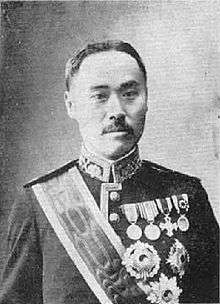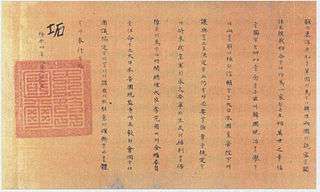Ye Wanyong
Ye Wanyong (pronounced [iː wɐȵoŋ]; 17 July 1858 – 12 February 1926), also known as Yi Wan-yong, was a Korean statesman who served as the last Prime Minister of Korea. He was pro-Japanese and remembered for signing the Japan–Korea Annexation Treaty, which placed Korea under Japanese rule in 1910.
Ye Wanyong | |
|---|---|
 | |
| 7th Prime Minister of Korea | |
| In office 11 August 1910 – 29 August 1910 | |
| Monarch | Sunjong |
| Preceded by | Pak Che-soon |
| Succeeded by | Office abolished |
| Personal details | |
| Born | 17 July 1858 Seongnam, Korea (now Seongnam, South Korea) |
| Died | 12 February 1926 (aged 67) Keijō, Japanese Korea (now Seoul, South Korea) |
| Ye Wanyong | |
| Hunminjeongeum | |
|---|---|
| Hanja | |
| Revised Romanization | I Wanyong |
| McCune–Reischauer | Yi Wanyong |
| Pen name | |
| Hunminjeongeum | 일당 |
| Hanja | |
| Revised Romanization | Ildang |
| McCune–Reischauer | Iltang |
| Courtesy name | |
| Hunminjeongeum | 경덕 |
| Hanja | |
| Revised Romanization | Gyeongdeok |
| McCune–Reischauer | Kyŏngdŏk |
Early life and education
Born to a prominent family in Gyeonggi Province, Ye spent three years in the United States from 1887–1891. Ye was a founding member of the Independence Club established in 1896 and belonged to the "reform faction" which wanted to Westernize Korea and to open the country to foreign trade.[1][2]
Career
Ye was a prominent government minister at the time of Eulsa Treaty of 1905, and was the most outspoken supporter of the pact which made the Korean Empire a protectorate of the Empire of Japan, thus stripping it of its diplomatic sovereignty. The treaty was signed in defiance of Korean Emperor Gojong, and he is thus accounted to be the chief of five ministers (including Park Jae-soon, Lee Ji-yong, Lee Geun-taek, Gwon Joong-hyun) who were later denounced as Five Eulsa Traitors in Korea.
Under Japanese Resident-General Itō Hirobumi, Ye was promoted to the post of prime minister from 1906 to 1910. Ye was instrumental in forcing Emperor Gojong to abdicate in 1907, after Emperor Gojong tried to publicly denounce the Eulsa Treaty at the second international Hague Peace Convention. In 1907 Ye was also chief amongst the seven ministers who supported the Japan–Korea Treaty of 1907, which further placed the domestic affairs of Korea under Japan's control, thus completing the colonialisation of Korea by Japan. Ye is therefore also listed in Korea amongst the Seven Jeongmi Traitors. In 1909, he was seriously injured in an assassination attempt by the "Five Eulsa Traitors Assassination Group".
Japanese rule

In 1910, Ye signed the Japan-Korea Annexation Treaty by which Japan took full control over Korea, while Korean Emperor Sunjong refused to sign. For his cooperation with the Japanese, Ye is also listed in Korea amongst the eight Gyeongsul Traitors. He was rewarded with a peerage in the Japanese kazoku system, becoming a hakushaku (Count), in 1910, which was raised to the title of kōshaku (Marquis) in 1921. He died in 1926.
Legacy
After the independence of Korea at the end of World War II, the grave of Ye was dug up and his remains suffered the posthumous dismemberment, which is often considered to be the most disgraceful punishment in Confucian ideology. Ye's name has become a byword for "traitor" in contemporary South Korea.
However, Seo Jae-pil's Dongnip Sinmun (Independence Newspaper) never wrote a single line of criticism against him.[3]
The South Korean Special law to redeem pro-Japanese collaborators' property was enacted in 2005 and the committee confiscated the property[4] of the descendants of nine people that had collaborated with Japan when Korea was annexed by Japan in August 1910. Ye is one of those heading the list.[5]
In popular culture
- Ye is portrayed by Woo Sang-jeon in the 2015 film Assassination.
- Both Ye Wanyong as well as Lee Wan-ik, a fictional pro-Japanese Korean Minister that resembles Ye in name and action, are characters in the South Korean television series Mr. Sunshine.
References
- Keith L. Pratt, Richard Rutt (1999). Korea: A Historical and Cultural Dictionary. Psychology Press. p. 186. ISBN 9780700704637.
- Kim, Jinwung (2012). A History of Korea: From "Land of the Morning Calm" to States in Conflict. Indiana University Press. p. 309. ISBN 9780253000781.
- English JoongAng Ilbo August 30, 2001
- Committee OKs Seizure of Collaborators’ Property The Chosun Ilbo,December 7, 2005
- South Korea: Crackdown On Collaborators The New York Times, December 24, 2007